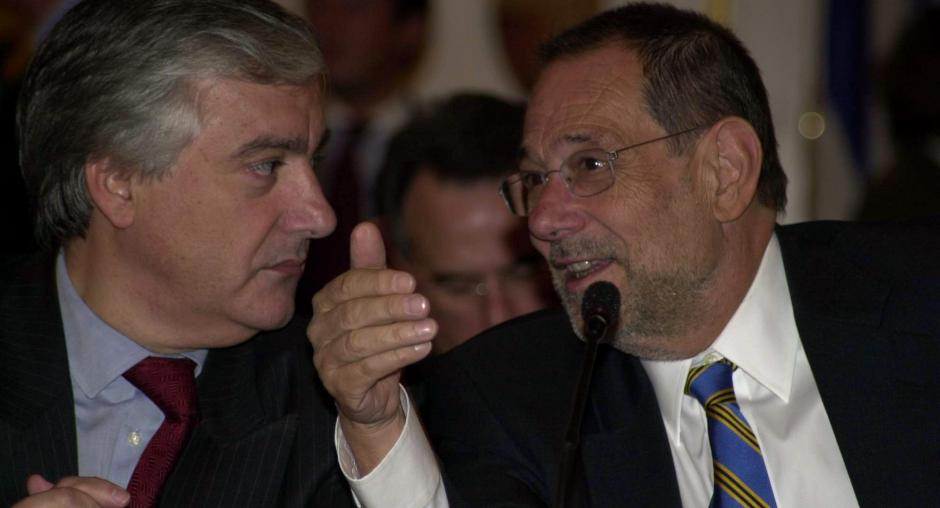Newsroom
Javier Solana describes OSCE as "natural-born partner" of the EU
VIENNA 25 September 2002

(Alex Nitzsche/OSCE)Javier Solana, High Representative for the Common Foreign and
Security Policy of the European Union (right), and Ambassador da
Costa, Chairman of the OSCE Permanent Council, 25 September
2002. (Alex Nitzsche/OSCE) Photo details
VIENNA, 25 September 2002 - Speaking to a special Plenary Meeting of the 55-nation OSCE Permanent Council, the High Representative for the Common Foreign and Security Policy of the European Union , Javier Solana, described the two organizations as "natural-born partners" which shared a common future and a common past.
He said that both bodies had been born out of the Cold War - as the European Community and the Conference on Security and Co-operation in Europe, respectively - with a similar desire: to establish forms of co-operation in Europe which would defuse the tensions between former enemies and prevent further conflict.
"As both institutions have grown in dimension and evolved in their competencies into the EU and the OSCE respectively, so too has their partnership grown and evolved."
Now it was expected that the EU would expand even further, with a decision on enlargement set for the forthcoming European Council in Copenhagen. "This new wave of enlargement, possibly the most important so far," he said, "will have a broad eastward thrust and will throw up new opportunities and challenges for us and for our Eastern neighbours."
Mr Solana believed that it was inevitable, given the history of the EU, its expanding geography, its widening role in world affairs, and the irreversible process of globalization, that it would increase its capacity to act as a political and security body in the world: "Not just because the EU wants this, but also because others want it of us.
"Equally inevitable, in my view, given our common past and shared values and objectives, is that co-operation between the EU and OSCE will strengthen and deepen over the coming years. The processes of co-ordination, complementarity and concertation will together form the future shape of that co-operation", he concluded.
He said that both bodies had been born out of the Cold War - as the European Community and the Conference on Security and Co-operation in Europe, respectively - with a similar desire: to establish forms of co-operation in Europe which would defuse the tensions between former enemies and prevent further conflict.
"As both institutions have grown in dimension and evolved in their competencies into the EU and the OSCE respectively, so too has their partnership grown and evolved."
Now it was expected that the EU would expand even further, with a decision on enlargement set for the forthcoming European Council in Copenhagen. "This new wave of enlargement, possibly the most important so far," he said, "will have a broad eastward thrust and will throw up new opportunities and challenges for us and for our Eastern neighbours."
Mr Solana believed that it was inevitable, given the history of the EU, its expanding geography, its widening role in world affairs, and the irreversible process of globalization, that it would increase its capacity to act as a political and security body in the world: "Not just because the EU wants this, but also because others want it of us.
"Equally inevitable, in my view, given our common past and shared values and objectives, is that co-operation between the EU and OSCE will strengthen and deepen over the coming years. The processes of co-ordination, complementarity and concertation will together form the future shape of that co-operation", he concluded.
